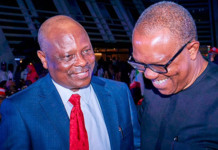The failure of the Nigerian National Petroleum Company Limited (NNPC) to make remittances into the federation account since February has significantly impacted the available resources to most states in Nigeria. In a bid to improve revenue, state governors are introducing new measures to tax the people. However, Prof. Charles Soludo is being criticised for allegedly taxing the poor in Anambra state.
Residents of Anambra State have continued to lament over the tax regime of Governor Charles Soludo, which appears to affect mostly.

In the state, taxes are imposed on market men and women, bus drivers, tricycle operators, wheelbarrow pushers, shop owners and hawkers, and even mourners.
Professor Soludo had on June 30 announced the introduction of a new tax regime in Anambra, noting that the new order would cancel all revenue collections through proxy and bring sanity in the system.
Disclosing this during a town hall meeting with transport and market union executives in the state, the governor said the new system, which commenced on July 1, would provide digital identity for all state taxes and levies paid, and commercial vehicle operators who make daily payments would not be required to pay again in any public park.
He said the affected unions would receive 5 per cent of earnings to run their separate business locations.
He also ordered that caretaker committee members in Anambra markets be prohibited from collecting money on behalf of the government, noting that moving forward, public parks owned by the government shall be directly handled by it, while private parks are not affected.
The governor said the new tax regime would bring about sanity and accountability in the system, while helping him to achieve his dreams for the development of the state.
Soludo alleged that the Nigerian National Petroleum Company (NNPC) Limited had not remitted any money to the federation account since February 2022, and as such, the state must devise a means to sustain its plans.
He said the state government introduced what was considered a minimal levy for tricycle operators (Keke), shuttle buses and others, explaining that they would eventually become beneficiaries.
He said the state government, after a careful thought, asked tricycle riders to start paying N15,000 each on a monthly basis, which equals N600 daily for 25 days. He noted that 5 per cent of the sum would still go to their union for the month.
Operators of shuttle buses were also asked to pay N25,000 monthly, while commercial motorcycle operators would pay N300 daily, which amounts to N7,500 monthly, N21,000, with a discount of N1,500 for one quarter, or N40,500, with a discount of N4,500 for half a year.
“Keke riders would be paying N600 daily at the cost of N15,000 monthly or N42,000 with a discount of N3,000 for one quarter or N81, 000 with a discount of N9,000 for half a year.
“Similarly, daily payment for shuttle/buses is N1,000 at the rate of N25,000 monthly or N70,000 with a discount of N5, 000 for one quarter or N135,000 with a discount of N15, 000 for half a year. For taxi drivers, the daily rate is N700 or N17,500 for one month. They have the option of paying N49,000 quarterly with a discount of N3,500 and N94,500 with a discount of N11, 000 for half a year.
“The rate of N1,200 daily is for township bus operators at the cost of N30,000 for one month, N84,000 with a discount of N6,000 for one quarter and N162,000 with a discount of N18,000 for half a year. Pick-up vans daily fee is N1,000 at the cost of N25,000 for one month, N70,000 with a discount of N5,000 for one quarter and N135,000 with a discount of N15,000 for half a year. All these are applicable in all government-owned parks in the state,” he said.




